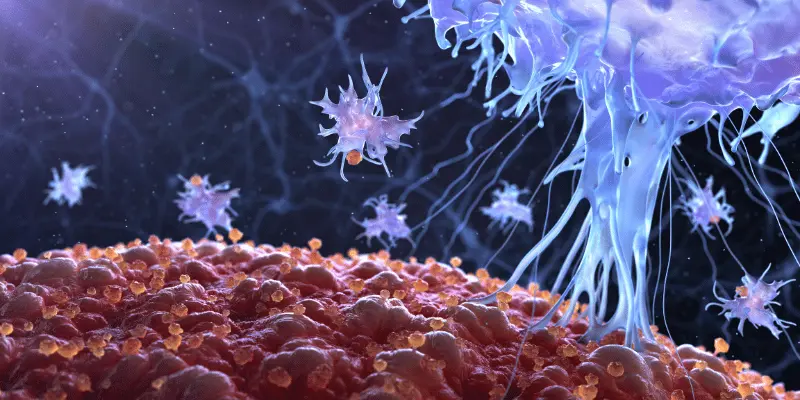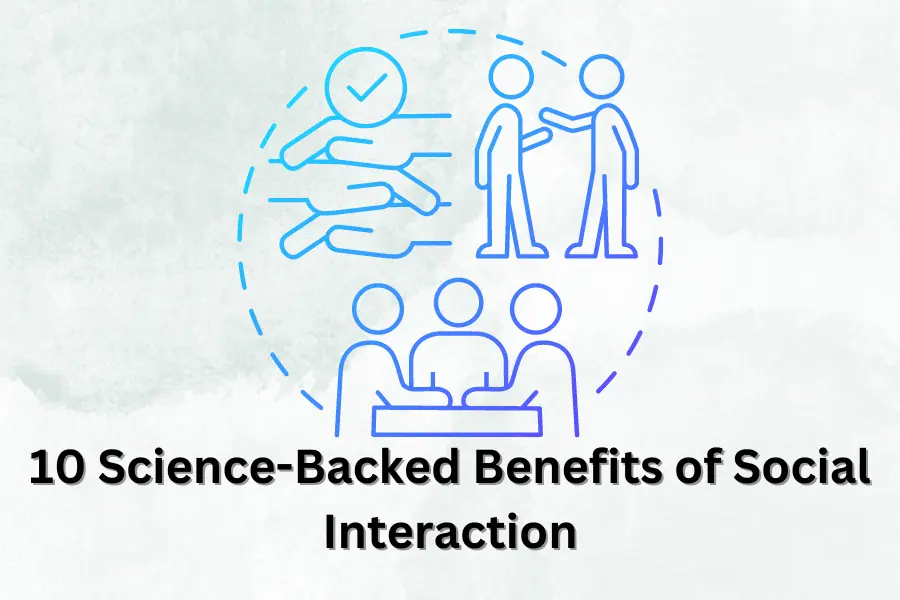Humans are social creatures. We crave interactions with others and when we don’t get any, it can impact not only our mood for the time, but in the long run, it has an impact on our health, both physical and mental. The 10 benefits of social interaction to us humans are not a new concept, it precedes older times when social connection was the only way to get entertained, given the absence of mobile phones and the internet.
To expand on this idea of the health benefits of social interaction and the consequences of no interaction, in the form of loneliness, this article has been written. If you proceed further, you will get 10 benefits of social interaction, discussing health behaviors, health outcomes, and social isolation as a specific health problem.
Social Interaction Lowers Risk of Premature Death by 50%


The health benefits of social interactions are linked to happy hormones that your body releases, so inevitably both your emotions and physical health are improved through social support. A 2010 meta-analysis found that individuals with strong social relationships had a 50% reduced risk of mortality. Social ties, therefore are recurring aspects for people to feel good about themselves and also be persuaded to get help for any disease or illness, through socialization.
Symptoms that may be ignored by the individual, when shared in a social setting can also result in motivating that person to get it checked. How many times have we seen that a person shares some symptoms, and a friend has a story about some other person they knew with the same symptoms and it turned out to be treatable? So, as we socialize, positive social influence can improve the quality of our lives and even reduce the chances of death.
Social isolation, on the other hand, is as harmful as smoking 15 cigarettes per day. Doctors even argue that if a person is not interacting socially, they can get a higher risk of heart disease, depression, and cognitive decline that may lead to dementia.
Socializing Lowers Levels of Stress Hormones


Although the exact scientific reasoning remains unknown, research has seen that positive social ties can reduce stress. It balances out hormones in the body, and social support increases certain hormones.
- Oxytocin, dopamine, and serotonin (happiness hormones) increase with social interaction.
- Cortisol and adrenaline (stress hormones) decrease.
As oxytocin increases, anxiety levels decrease automatically. Similarly, lower levels of adrenalin and cortisol mean that you are much calmer and more content. This improves immune function as well. As per research, cortisol is an inflammatory hormone, which in lower numbers is good, but higher quantities can impact the immune system. Among the 10 health benefits of social interactions, social networks can decrease cortisol levels and affect health by improving immunity.
Social Ties Improve Cardiovascular Health


Social relationships and heart health are interconnected. The mental and physical health of a person improves with an increased perception of social connectedness. The direct connection is that social support from peers ingrains good habits and decreases smoking rates, unhealthy food consumption or drug abuse. As a result, cardiovascular health remains strong.
However, studies also show that people with more diverse social networks have lower blood pressure and healthier hearts. Social support also aids recovery after cardiac events. The benefits of socialization on diversity are rooted in the understanding that diversity encourages better health. A friend with a diverse friend group, therefore has more knowledge on how to live a healthy life.
Socialization Wards off Cognitive Decline
One of the reasons for cognitive decline, seen in patients of dementia, is social isolation. Feelings of loneliness among older patients, as they age have been seen are precursors for poor cognition. The health and wellbeing of any individual, irrespective of illness or disease is dependent on them being socially connected. Socially engaged seniors exhibit better memory, reasoning, and processing speed.
Social activity may also protect against Alzheimer’s and dementia. Researches show that social circles in old age homes have an impact on health, such that it ensures that connectedness leads to greater cognition and delayed decline. This is why, doctors tell families and caregivers of dementia patients to connect with them and spend time with them so that they do not feel lonely.
In-person interaction Has the Greatest Benefits
Social connection, although important, does not always happen in person. You can connect to a person via mobile phones and text messages, but in-person interaction has proven to have the greatest benefits. It can:
- It can help you better communicate with the loved one and form an emotional connection
- It builds trust between parties, as you spend time through stressful as well as happy times
- It ensures that communication remains clear, with both verbal and non-verbal cues being used for interaction
- It builds a lasting life-long relationship, as you sort through problems
- It can reduce the risk of diseases among older patients, mortality risk, risk of dementia or covid-19
Social Relationships Can Help You Live Longer


The advantages and disadvantages of social interactions have a variety of positive effects on the person who is old and frail or even diagnosed with dementia. Irrespective of the health issue, social relationships foster a community that is caring, loving, and trusting. This is why, members of a positive group are likely to live longer. A 2015 meta-analysis found that individuals with adequate social relationships had a 50% greater likelihood of survival compared to isolated individuals.
In a medical context, researchers have also found that patients with a greater number of visitors, who consistently visit are also much more prepared to cope with their illness. Department of Health and Human Services found that patients feel less pain and anxiety when they have a strong social support system, from family, friends, and partners.
Social Connectedness Fights Depression and Anxiety


Connectedness in a social setting relates to routine interactions, exchanging routine information, and also managing each other’s emotions. In scientific studies conducted on this subject, it has been found that when a caregiver is present for a patient with depressive symptoms, the presence of family networks and social support reduces depression in the person. Loneliness is strongly associated with poorer mental health, especially depression. Face-to-face social interaction releases endorphins that elevate mood. Therefore, irrespective of the person’s age, gender, or ethnicity, if they are depressed and have social connections, then with time depressive symptoms tend to decline.
As a result, it is considered critical among health professionals that social groups must have link between social interactions, which can improve overall population health. Construction projects of parks, museums, and restaurants that allow for positive social settings, which enable a sense of belonging and help to stay connected are considered to go a long way for public health.
The Quality of Relationships Matters
However, not all social interactions are good. For instance, the research that found social interaction can impact depression positively also found that if the caregiver is stressed, then the patient can also become more depressed by taking on the stress. Similarly, the context of a social setting is important, as it doesn’t cause health promotion, but can cause damage. For instance, snarky remarks, bullying, or emotional abuse occur in social settings. Instead of a healthy lifestyle, they promote depression and anxiety and do not allow the person to live longer.
Socializing Boosts the Immune System


However, when social interactions remain positive, then research shows that social effects are on health across the board, i.e. on physical as well as emotional health. Studies show that people with more social ties have improved immune function. Factors of high blood pressure, diabetes, and pain associated with wounds can be decreased through strong social connections or even social animals. This is why, doctors recommend cancer patients to get a support dog and highlight the importance of staying connected to family and friends for improving health conditions.
Social support also helps wound healing and reduces inflammation. Ongoing social research has shown that individual health improves for patients, as happy hormones are released from self-rated health.
Staying Connected Improves Health Behaviors
For better mental and individual health, staying connected is the solution. People with strong social networks are less likely to smoke, be inactive, or drink excessively. Friends encourage healthy lifestyles, which is why it is inevitable that we agree on the benefits of social interactions and the role of social connectedness in encouraging a healthier lifestyle.
Negative social settings can result in body dysmorphia and health outcomes among people can be negative. However, social isolation and social deprivation can also result in lifestyle choices of smoking, alcohol consumption, and lack of exercise. Therefore, both are extremes that must be avoided.
Friendships Have the Strongest Influence
Social support may come in many different forms. Mother, father, siblings, life partners, caregivers, or mental health professionals, but out of all of these your friends hold the most importance. In-person interactions with friends, resulting in laughter and calm moods reduce the risk of developing bad habits and are good for the soul. However, in this case, human contact with a friend only holds importance when that friendship is positive and wholesome.
Socialization Can Reduce Pain
When researchers decided to analyze why patients with greater social circles feel less pain, they found that social groups offer distraction. As friends talk and interact with the person, they are entertained and are distracted away from the pain that they may feel. Staying connected to other people’s lives and listening to their problems also makes you doubly grateful for what you have. This is why, interactions may make it seem like your problems are not the biggest problems.
At the same time, loneliness can promote psychological and physical disintegration, as you feel the pain at greater frequency.
Costs and Benefits of Social Relationships: Inequalities


Connecting with others has both pros and cons for the people involved. These are given as follows
Pros:
- Studies demonstrate that social support and distraction during painful procedures significantly reduce pain.
- Companionship decreases chronic pain over time.
- The road to recovery becomes much more easy and clear, as responses to stress and anxiety or even depressive symptoms are managed with a positive mindset
- They can put your brain at ease, as others take over your care and you can finally give up control
- They help you live longer
Cons:
- They can result in conflict, which results in greater stress and does not decrease stress from a person’s life
- A social setting can be stressful for certain people. For instance, visiting a dentist talking to an old friend, or reconnecting with old acquaintances. These situations, rather than distracting from pain or depression, can enhance anxious feelings, resulting in psychological distress
- The risk of depression and feelings of loneliness are not limited to social isolation, as one can feel not seen or heard even when sitting in a social circle. The quality of meaningful relationships is more important than just any social interaction
- Social interactions, especially those that are charged with emotion can be physically and mentally exhausting for people
Discover the Importance of Staying Connected with Friends and Family.


By this point in the article, it is clear that rather than just any interaction, socialization enforces you to stay healthy, if it is based on loving, trusting, wholesome and meaningful relationships. This is why, friends and family members that encourage feelings that are positive and make you feel better are the ones you should focus your energy on.
In this regards, you must discover how important it is to stay connected with them. Rather than letting the relationship frizzle out as you grow older, make the effort to meet up for a lunch or go shopping together for a social connection. This will particularly help you out especially in later life stages, as you become older adults and can show off on having lifelong friendships.
To form such meaningful friendships, you can:
- Arrange a weekly Skype call
- Schedule a lunch date with a friend months in advance, if your schedule doesn’t allow sudden plans
- Schedule a dinner date with your partners and their partners for a long-term emotional connection
- Invite people over for dinner, especially family members. So that not only you, but your children can also benefit from creating social connections to their relatives
- Meet up on holidays, like during Christmas break or summer vacations
- Plan a holiday together
Use Statistics and Examples to Support Main Points
A few recent stats have been joined together to highlight the importance of socialization. They are as follows:
- Engagement with friends stood at 60 minutes per day in 2003, but in 2019 it declined to 34 minutes per day.
- Daily screen time has also been consistently increasing. At a 13% increase, a whole 49 minutes has been added to screen time. Currently average screen time of an adult in the world is 2 hours per day, which means they are alone
- In a study conducted on outcomes of health relationships, 53.3% of respondents showed satisfaction in life because of healthy social connections
- At an interval rate of 95%, being lonelier can increase the risk of dementia. The risk of hospitalization increases by 20%, if the patient has a cardiovascular illness and no social support group
FAQ’s:
Q. Are Social Interactions Decreasing?
A. Yes, from the statistics collected on this issue, it shows that daily screen time that is spent alone has been increasing for the past many years, while time spent with others has been decreasing consistently. This means that as a society, we are moving towards lonelier lives that can impact both physical and mental health
Q. Can Loneliness Break Your Heart?
A. Yes, in certain instances it can. Feelings of being forgotten by your social group or not feeling seen or heard by your peers can break your heart
Q. What are the Disadvantages of Social Interaction
A. A social interaction can result in stress, conflict and even bullying, all of which has severe negative consequences on one’s health.
Overall, social settings are mostly good for you. Make sure to form loving and meaningful relationships with your friends and family. However, if you social circle leaves you feeling exhausted, drained and stressed out, then it is most likely resulting in greater stress than happiness in your life. In this situation, learn to cut out people from your life and pursue social activities that can help build new trusting and loving friendships or reconnect with family members who can extend their support.



